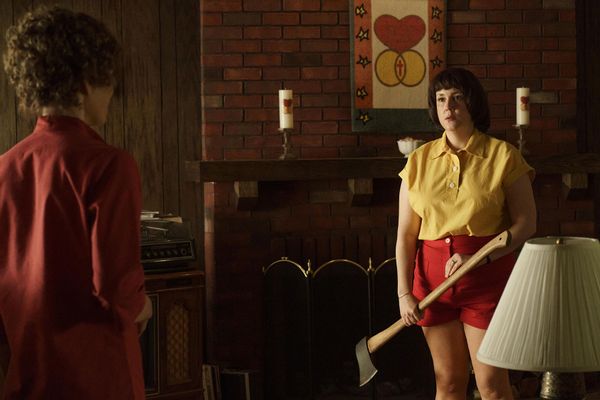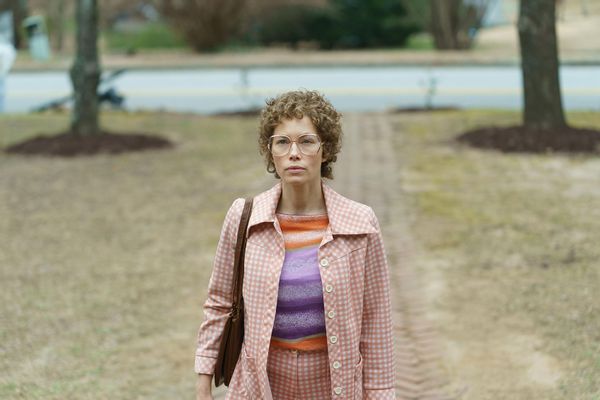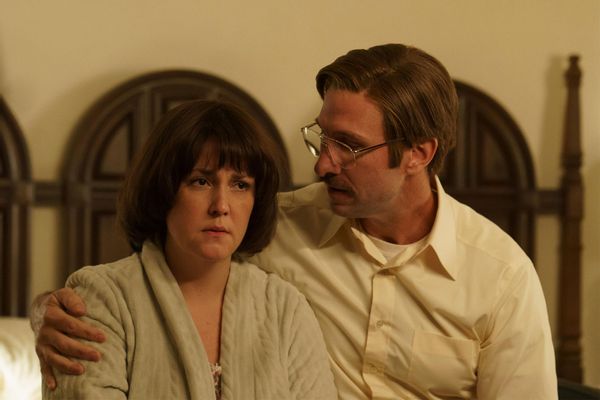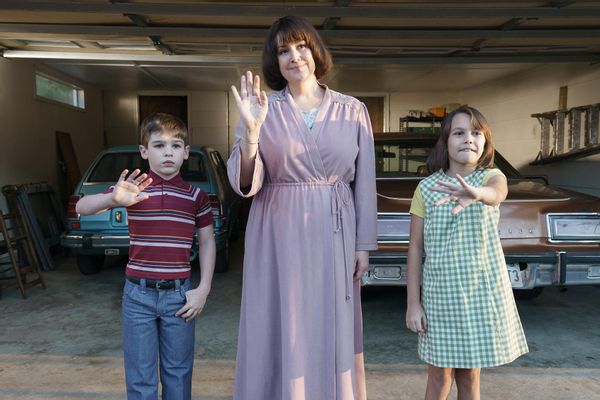
There's been a recent glut of films and TV shows set in the '70s and early '80s, and as a child of the '80s, I'm trying to remember . . . was it really that cool? And dark? The details were lost on me as a kid, but Hulu's true crime limited series "Candy" recreates the era in all its shag carpeting, perms and oversized glasses glory.
"Candy" tells the story of the murder of Betty Gore (Melanie Lynskey), a mother of two and housewife brutally killed in her Texas home in 1980. The Hulu series makes no secret of the fact it was Candy Montgomery (Jessica Biel), a fellow Texas mother and housewife, who wielded the ax that killed Betty. But how and why the ax got in her hands, and what happened before and after, is another story.
"Candy" is rich with the transformative performances of Lynskey and Biel and syrupy thick with retro touches. The walls are avocado green. The shorts are short, the collars wide. And on the table when Betty died? A newspaper, open to a story about the horror film "The Shining," which had premiered just a few weeks before.
RELATED: "The true crime of Hulu's Jessica Biel-Melanie Lynskey murder series "Candy" is its wasted potential"
That detail is true, though in real life, it was an advertisement and not an article about Stanley Kubrick's film splayed open on Betty's table, splattered with blood.
That's not the only macabre coincidence. Betty was murdered on Friday the 13th (when Hulu released the "Candy" finale), which happened to be the opening of another horror film featuring a bloody ax, the first "Friday the 13th" movie. As The Dallas News reported: "The Gores' house was the 13th from the corner. From the time of the death until the body was discovered took about 13 hours. From the day of the death until Montgomery was arrested took 13 days."
Solitude isn't going to go great for Jack, either. Some people just aren't cut out to be writers.
But "The Shining" is the film that takes on significance in "Candy," mentioned multiple times by officers investigating the scene (shout out to two certain husbands I'd love to see in a buddy cop flick) as well as by Candy's lawyer in court as a possible explanation.
"The Shining," in case you've been under a hedge maze, is based on Stephen King's novel of the same name. It's the story of Jack Torrance (Jack Nicholson), a struggling writer who takes a job as a winter caretaker for Colorado's remote Overlook Hotel, which closes down over the snowy months. He moves into the rambling hotel along with his wife Wendy (Shelley Duvall), and young son, Danny (Danny Lloyd), who is psychic.
The Overlook Hotel has a dark history. One of its past winter caretakers had a breakdown and killed his entire family with an ax. Solitude isn't going to go great for Jack, either. Some people just aren't cut out to be writers.
Although a classic today, the film wasn't exactly a critical darling when it premiered. King wasn't even a fan of the adaptation, and the movie did not crack the Top 10. It's also not the movie Candy and her family go to see in the Hulu series, taking along Betty's eldest daughter, a friend of the Montgomery girl, because she wouldn't be allowed to see it otherwise. That would be "Star Wars: Episode V - The Empire Strikes Back."
What a year for films! So why is "The Shining" that one that looms so large in the "Candy" imagination?
There's that ax

The ax is the violent video games of "Candy."
One of the most shocking aspects of Betty's death was the murder weapon and the severity with which it was applied. Candy struck Betty with a number of blows approaching Lizzie Borden proportions, well beyond what was needed to kill. It's not only that a good, church-going, God-fearing woman like Candy would murder – but the graphic nature of the instrument, the same instrument Jack uses to break down a door and go after his family in "The Shining." How could a woman have gotten the idea to use an ax if not for the film, the cops theorize? The ax is the violent video games of "Candy." The temptation of it hanging on a wall is too great, pulsing with murderous potential like a flashing red light.
Infidelity

Candy creates a pro/con list on poster board, like a regional sales meeting on why she should cheat.
As Matthew Rozsa writes: "Jack was a bad guy before he moved the family to the Overlook Hotel." Although film viewers are not given indications of past cheating on his wife, Wendy, we certainly learn Jack of "The Shining" has been extremely violent with his family and is an alcoholic. And once at the hotel, Jack stumbles into a room and into the arms of a strange, naked woman. He's fine with it, for a time.
Marital infidelity is a big part of "Candy." It may be motive — an actual reason for the graphic murder is in short supply in the series, unfortunately— but cheating is as omnipresent as bowl cuts. Infidelity is methodical, rote and precisely planned out in the series — Candy creates a pro/con list on poster board, like a regional sales meeting on why she should cheat — the opposite of the Harlequin-esque romance paperbacks women in the show devour.
Ghosts
Both "The Shining" and "Candy" use ghosts, though perhaps unsurprisingly, the horror film does so more effectively. The ghost in "Candy" is impatient, sadly disapproving and underused. It mostly just stands around looking vaguely annoyed at the proceedings. Still, it's an interesting insertion of the fantastical in an otherwise straightforward true crime retelling.
Violence against women
One of the ways the film "The Shining" differs from King's novel is the characterization of Jack. In the movie version, he was a violent abuser before he even stepped foot in the hotel, breaking his son's arm in the past. The Overlook doesn't make things better. Even those who have never viewed the film likely know its key scenes: Jack smashing through a door with an ax, manically grinning, to get to and harm his shrieking wife and cowering child. King disliked the film's portrayal of Wendy, but she's a woman who's been through a lot, including repeated spousal abuse, both physical and psychological.
The violence against women of "Candy" takes a different approach: it's mostly women hurting other women, though Betty's husband Allan (Pablo Schreiber) neglects her and worse. Cheating is a form of abuse, as is gaslighting Betty into disbelieving her reality, downplaying and belittling her very real signs of depression.
Silent suffering

If he doesn't know the name for her depression yet, he still recognizes a dark shadow.
Isolated from the group of other local women, who are judgmental and close ranks against her for no reason other than her quietness and awkward dowdiness, Betty is shown mostly alone with an infant. Her struggles with postpartum depression feel painful, not the least because Allan dismisses her (and because Lynskey's performance is so real it aches). He repeatedly goes on work trips, leaving her with the kids and no help (his inability to run the house, even to run the dishwasher, after her death illustrates that he has never helped). Betty has no hobbies, no outside interests. Everything she does is for the family, like sewing clothes for them.
Betty is an interesting character to compare to Wendy in "The Shining," who's been a target of her husband's abuse for a long time. Wendy also has nothing outside the home. She uproots her family for her husband's book (what about her book?). But unlike Betty, Wendy clings to happiness for the sake of her son. She still laughs, play games with him, finds joy for him. She also learns to run the damn place, keeping the massive hotel going entirely by herself and managing to make a sort of friend in the park ranger she calls to check in.
A difference in the women's struggles is also their husbands. Jack is the source of Wendy's torment, her abuser and the abuser of her son. Allan, Betty's husband, knows Betty is having a hard time. If he doesn't know the name for her depression yet, he still recognizes a dark shadow. He knows and does nothing.
Want a daily wrap-up of all the news and commentary Salon has to offer? Subscribe to our morning newsletter, Crash Course.
Silent victims

It's hard to make it out from a violent past. You can never run far enough. The ax isn't the only thing hanging over the characters of both stories and its shadow will be hard to escape.
More stories like this:







